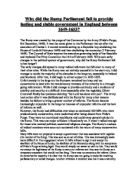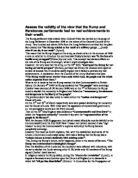Many MPs were not prepared to accept a government that was associated with regicide (the murder of the King). This was seen as an act of crime. This was increasingly made more difficult in The engagement where 22 MPs refused to sign it and accept the abolition of the House of Lords, the abolition of the Monarchy along with the acceptance of Pride’s Purge as being legal. They would simply not swear an oath to this. They would not accept the legitimacy of the Rump to carry out reforms and they saw the Rump as a temporary expedient that would not last long. There was no consensus for reform. Given its conservative majority it is clear that the Rump was not going to make far-reaching parliamentary or social changes. Another criticism it received was that it was a minority regime with virtually no popular support. It was just a tool of the Army. It was also thought to be republic in name only with no real commitment to democracy. However there were even more obstacles it had to deal with in 1649 besides the barrage of criticism it received. This would make it undoubtedly more difficult for the Rump to provide lasting and stable government in a time when there were serious economic problems, because bad harvests took place during 1649 and 1650. Not only did this cause social distress, but at the same time the regime was in serious debt.
Legislation was a major obstacle to reform. It was a complex subject. The Rump was responsible for both the planning and debating of necessary legislation and the daily maintainance of government. This was a massive task that made progress to constitutional refroms a laborious process because of the increased workloads.
In addition, after the new republic was declared, it faced many enemies. Royalists had no real love for it and Presbyterians had very little. The Rump was pressurised by the army but even the army was a potential enemy because many soldiers were still owed large sums of back pay. Many regiments mutinied until arrears were eventually paid by 1650. The Army also wanted to see reforms. They wanted laws to be more accessible and break the monopoly in the legal profession. Given that there were fourty-four lawyers in the House, there would not be drastic changes to the legal establishment. Also, given that the Rump represented commercial interests, it was unlikely they would abolish the privileges of big corporations or monopalies that the radical elements of the army and the Levellers hated. This would cause increased frustration to the Army who also desired a new constitution and social reforms to include a more representative form of government. There were 211 MPs in the Rump. 70 would attend the sitting, but the composition and number of MPs who were active meant it was unrepresentative at that level. On 14 May Cromwell and Fairfax took a body of mutineers at Burford by surprise, captured 300 in the night. Only three mutineers were shot. This shows the army helped to deal with particular incidents to provide a stable government but it was still an obstacle to the Rump because of its demands for reform.
Furthermore, there were external problems including the rebellion in Ireland. Many Irish Anglicans and Catholics formed a united opposition to the execution of King Charles I. This enhanced the possibility of an invasion of Charles II with foreign help. The Irish Rebellion had continued since 1641, after Sir Thomas Wentworth who governed Irelaand using the 'rule of thorough' came back to England to advise Charles I. During this time the attrocities and emotions had escalated . By September 1641 there was a threat of a second army plot. Irish Catholics massacred protestants and there was a fear that they could make their way to England and join English Catholics. In February 1642, the Long Parliament issued the Adventurers Act in which parliament would gain military support to control the problem and in return give land in Ireland. There was every reason for Cromwell and the Rump to be concerned with Ireland. There were also problems in Scotland and the threat of a Royalist invasion. Both these posed a security threat to the Rump in England. Later, there would be a war with the Dutch ( for commercial reasons ) on 19 May 1652. With many campaigns being executed during the time of the Rump, reforms would have to take a back seat. Charles II was a threat right until September 1651.
Closer to home, the Levellers who feared being denied influence launched a bitter attack on Oliver Cromwell and Henry Ireton. They accused them of being ambitious and deceitful. The Levellers aimed to also use the army as a power base which was very dangerous. The Rump had to try and resist pressure for changes of a politically radical nature to avoid instability. The Levellers wanted the parliamentary franchise extended to the 'middle sort of people', a more representative distribution of seats and recognition of certain fundamental human rights and freedoms. Therefore the Rump ordered the arrest of its leaders, and they were imprisoned in The Tower of London. A Leveller-inspired rising resulted in its Leveller leader, William Thompson being shot. This created some discontent amongst radicals. In October 1649 John Lilburne was tried for treason, but acquitted later. The Rump then ordered him to be exiled.
By 1649 more radical left-wing groups such as the True Levellers or Diggers and religious sects such as the Fifth Monarchists, Ranters and Quakers seemed to overshadow the Leveller cause. They overrode all considerations of law, conventional morality and religion. This could be a barrier to sustainable progress for the Rump who were alarmed at the situation. Fortunately for the Rump Parliament, though these groups attracted many people, they were too fragmented to prove any effective threat to the regime. It is argued their existence made the Rump more conservative. The establishment of the republican Commonwealth in 1649 would cause a more godly society to emerge and justify the revolution had caused a multitude of radical religious and secular proposals which eventually fell on deaf Rumpers ears. The Rump wanted to contain the spread of radicalism. This would mean the Rump would not authorise complete religious toleration.
With such a vast number of obstacles to deal with, the Rump did have achievements. This is because the Commonwealth government functioned successfully-collecting taxes, upholding property and keeping the peace in very difficult circumstances. England became powerful in European politics and trade and colonial interests flourished under the republic. The Rump also successfully 'reinvented' the English political landscape. There were many administrive chnages and the civil aervice was founded. The Rump buiilt up the navy and by 1652 there were 100 warships. The wars forced the governments to modernize and in 1649 the Rump needed force to deal with Ireland and Scotland.







